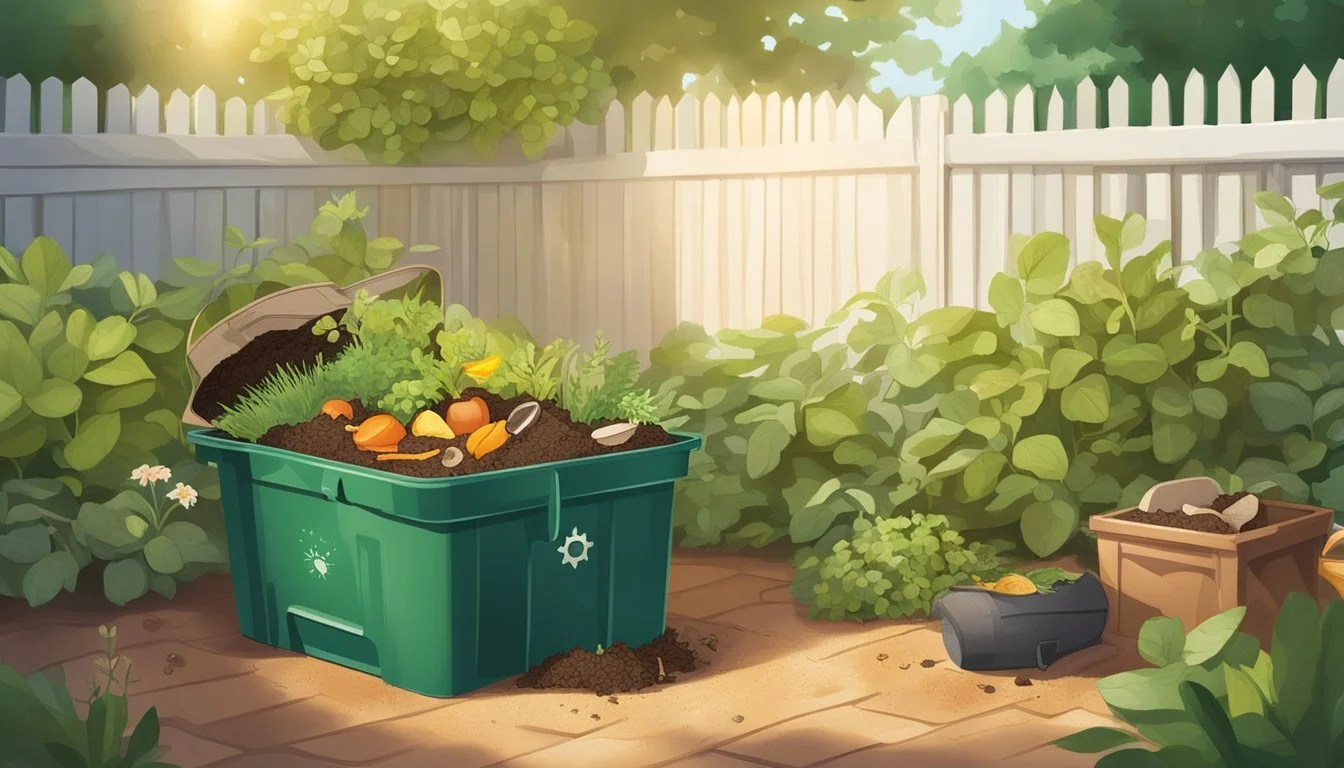Guide to Composting in Arvada, CO
Essential Tips for Local Residents
Composting in Arvada, Colorado, represents a growing effort to reduce waste and contribute to a more sustainable environment. As communities across the nation become more eco-conscious, Arvada residents have access to multiple services that facilitate the responsible disposal of organic waste. Composting turns food scraps and yard waste into nutrient-rich soil, diverting these materials from landfills where they would otherwise produce harmful greenhouse gases.
The city's composting services cater to both individual households and the community at large. Companies such as Compost Colorado offer curbside compost collection, allowing residents to easily contribute to soil enrichment without having to maintain personal compost systems. Similarly, services like Dirt Cheap Compost provide budget-friendly weekly pick-up, supplying residents with the necessary bins and bags to start their composting journey. These convenient options reflect Arvada’s commitment to integrating sustainable practices into daily life.
For those interested in starting their own backyard composting, local resources are available to offer guidance on best practices suitable for Colorado's distinct climate and conditions. By engaging in composting, Arvada residents play an active role in reducing their carbon footprint while enhancing the quality of soil in their gardens and community spaces.
The Basics of Composting
Composting, a key component of sustainable living, transforms organic waste into nutrient-rich soil, offering profound environmental benefits by reducing landfill methane and CO2 emissions.
What Is Composting?
Composting is the natural process by which biodegradable materials break down into humus, a dark, rich soil amendment. This process is facilitated by the combined action of microorganisms, insects, and fungi, which decompose organic matter such as leaves, kitchen scraps, and lawn clippings.
Benefits of Composting
Reduces waste: By composting, individuals can divert a significant amount of their household waste from landfills.
Improves soil quality: The final compost product enriches soil, fostering plant growth and retaining soil moisture.
Mitigates climate impact: Composting organic material turns potential methane emissions into CO2 through aerobic decomposition, which is less impactful on the environment.
Composting Methods
Cold composting: Involves simply piling up garden waste and kitchen scraps and leaving them to decompose over a year or more.
Hot composting: Requires balancing carbon-rich materials (browns) and nitrogen-rich materials (greens) to produce compost more quickly, typically within several months.
Selecting Your Composting Site
Choosing an appropriate site for composting in Arvada is crucial. The site should be:
Easily accessible: To add materials and manage the pile throughout the year.
Well-drained: To prevent waterlogging, which can lead to anaerobic conditions and odor problems.
Partially shaded: To maintain ideal moisture and temperature.
By understanding these essentials of composting, residents of Arvada can effectively reduce their environmental footprint and contribute to the rejuvenation of their local soil ecology.
Setting Up Your Compost System
Setting up a compost system in Arvada, CO is a practical way to manage food and yard waste, turning scraps into rich soil for the garden. Choosing the right type of compost bin and understanding how to build a compost pile are critical first steps.
Types of Compost Bins
Stationary Bins: Stationary bins are a great "set and leave" option. They are typically enclosed on all sides and sometimes have a lid to deter pests. These bins keep yard waste and food scraps out of sight and help contain the composting process in one location in the garden.
Tumbling Bins: These bins are mounted on a frame that allows them to be rotated. This rotation aerates the pile without the need for turning and speeds up the composting process. Tumbling bins often produce compost more quickly than stationary bins.
Worm Bins: Worm bins, or vermicomposting systems, use worms to break down food waste. They're ideal for indoor use or in small outdoor spaces, and produce both solid compost and a nutrient-rich liquid.
Building Your Own Compost Pile
To build a compost pile:
Choose a location: Select a dry, shady spot near a water source for your compost pile or bin.
Start with a layer of coarse material: This allows for aeration and drainage.
Add materials in layers: Alternate moist materials like food scraps with dry materials like leaves or straw.
Keep it aerated: Turn the pile every few weeks to provide oxygen, which is essential for composting.
Maintain moisture: Your compost should be moist but not soaked; think of the consistency of a wrung-out sponge.
By following these steps when setting up your compost system, you contribute positively to the environment and create a sustainable source of nutrients for your garden. Whether one opts for curbside compost collection services or chooses to manage it personally, composting is a rewarding endeavor in Arvada, CO.
What to Compost
Successful composting requires a balance of green and brown materials in the compost bin. One must ensure not to introduce materials that can spoil the compost process.
Green Materials
Green materials provide nitrogen, a key component in composting. They are often moist and decompose rapidly. Examples of green materials include:
Fruit scraps (apple cores, banana peels, avocado rinds)
Vegetable peels and scraps
Fresh plant and garden clippings
Coffee grounds and filters
Tea bags (without the staples)
Brown Materials
Brown materials are a source of carbon and give the compost necessary bulk. They decompose slower than green materials. Ideal brown materials consist of:
Dry leaves and twigs
Straw and hay
Paper and cardboard (shredded)
Eggshells (crushed)
Sawdust from untreated wood
Items to Avoid in Compost
Some items should not be included in a compost pile as they can attract pests, cause odors, or contain harmful pathogens. Make sure to keep these materials out:
Meat, fish, and bones
Dairy products
Oily foods or grease
Diseased plant materials
Pet wastes (cat or dog feces, cat litter)
Any treated or painted wood products
Being aware of the right balance between green and brown materials, as well as knowing what to exclude, can lead to efficient composting and enrich one's garden soil.
Composting for Different Housing Types
Whether living in a spacious single-family home or in a more compact living situation like an apartment or condo, residents of Arvada have sustainable options for composting. This section will guide different homeowners and renters through the right composting methods suited for their housing type.
Composting in Single-Family Homes
Single-family homes in Arvada generally offer the most flexibility for composting methods. Homeowners have the space to set up traditional backyard composting systems outside. These systems can include:
Open piles or bins: Requires a suitable space in the yard and regular maintenance to manage the compost.
Rotating compost tumblers: Simplifies turning the compost and accelerates the decomposition process.
Some local services, like Compost Colorado, provide curbside compost collection, which can be especially convenient for those lacking the time or space for outdoor composting.
Composting in Apartments and Condos
Apartment and condo residents often face space constraints that make traditional composting methods impractical. However, smaller-scale methods can be utilized, including:
Vermicomposting: Using worms to compost organic waste indoors, suitable for keeping under the kitchen sink or in another discreet area of the apartment.
Bokashi composting: An anaerobic process which ferments kitchen waste in a sealed container, ideal for small spaces with no yard access.
Residents of multi-unit dwellings can also investigate community drop-off programs as highlighted by Scraps, offering convenient access to composting facilities.
Maintaining Your Compost
Maintaining a compost pile in Arvada, Colorado requires attention to detail, specifically in managing aeration, moisture, temperature, and the process of harvesting the finished compost. By keeping these factors in balance, one ensures efficient decomposition and high-quality compost.
Aeration and Moisture
Compost needs air to support the aerobic microbes responsible for breaking down organic matter. Aeration can be achieved by turning the compost regularly, ideally once a week. This process introduces oxygen and prevents the materials from becoming too compacted. Moisture is equally important; the compost should feel like a wrung-out sponge. If it's too dry, one should add water, and if too wet, one can add dry, carbon-rich materials.
Temperature and Turning
Monitoring the temperature of the compost helps track the progress of decomposition. An active compost pile will heat up to about 130-160°F. If the temperature drops significantly, it may require more nitrogen-rich materials or another turn. Turning not only helps with aeration but also aids in mixing the materials, which redistributes heat and microbial activity.
Harvesting Your Compost
Once the center of the compost no longer heats up and the materials have turned into a dark, crumbly, and earthy-smelling substance, the [finished compost] is ready. It typically settles at the bottom of the pile. To harvest, one should remove the uncomposted layers on top and set them aside to start a new pile, collecting the finished compost with a shovel or screen for any large materials not yet decomposed.
Community Composting Initiatives
Arvada residents have the opportunity to engage in community composting initiatives, fostering sustainability through local drop-off sites and a collective effort to manage organic waste. These programs reduce landfill use and enrich the local soil with nourishing compost.
Local Drop-Off Sites
In Arvada, and the greater Denver area, local drop-off sites are integral to the composting infrastructure. Compost Colorado, referenced in a guide to community composting, offers curbside pick-up services extending to multiple neighborhoods. These sites serve as a practical option for residents to dispose of their organic waste, which is then processed into compost that can be used to support soil health in community gardens and landscapes.
Composting as a Community Effort
Community composting goes beyond individual action; it encompasses a partnership among residents, local businesses, and city initiatives to manage organic waste collectively. The city of Arvada not only encourages community composting through educational resources but also actively engages in programs that cater to the collection and repurposing of compostable materials. These efforts highlight the collaboration that is necessary for the success of community-wide sustainability practices.
Municipal Support and Regulations
In Arvada, Colorado, composting is supported by municipal services that align with city regulations. These efforts play a vital role in waste management for the city and its position within the Denver metro area.
City of Arvada Composting Services
Arvada offers composting services that encourage the reduction of waste in the city's service area. Residents are able to access detailed information about composting from the City of Arvada's official website. Here, one can find guidance on what can be composted, how to compost effectively, and locations where compostable materials are processed.
Composting services include:
Collection of yard waste
Drop-off locations for compostable materials
Education and outreach programs
Guidelines and Legal Aspects
The city has enacted specific guidelines to ensure that composting practices meet legal and environmental standards. For comprehensive information about the municipal codes that govern waste management and composting, the Municipal Code page provides an invaluable resource. It is important for both residents and businesses in the Denver metro area to follow these regulations to avoid penalties and to contribute positively to the community's sustainability efforts.
Legal aspects to consider:
Registration: Composting facilities must register with the Department of Public Health & Environment as outlined in the state regulations.
Operating Guidelines: Standards for design, operation, and monitoring of compost facilities to ensure compliance with regulations.
Zoning Laws: Areas within Arvada may have specific zoning laws that affect where composting can take place.
Innovations in Composting
Composting, as an integral component of municipal waste management, has seen rapid innovation aimed at improving efficiency and sustainability.
Technological Advancements in Composting
Recent years have borne witness to significant technological advancements. One such development is the evolution from traditional methods to AI-assisted composting systems. These systems optimize the decomposition process, ensuring faster turnaround while monitoring vital parameters like temperature and moisture. Real-time data collection via sensors not only informs immediate adjustments but also contributes to a strategic understanding of long-term composting trends. Additionally, advancements such as in-vessel composting equipment help contain odors and expedite the process within controlled environments, making composting feasible even in urban settings that may lack space for windrow composting. For those interested in these high-tech methodologies, Compost Colorado's services offer a comprehensive approach to modern composting in residential applications.
Human Composting
Human composting, or natural organic reduction, converts human remains into soil as a sustainable alternative to conventional burial or cremation methods. This practice aligns closely with zero waste goals by ensuring that even in death, individuals can minimize their environmental impact. Through a carefully managed biological process that administers the ideal balance of carbon, nitrogen, oxygen, and moisture, human remains are gently transformed into nutrient-rich compost. This initiative not only reduces the space needed for cemeteries but also nourishes the earth. In Washington state, where human composting has been legalized, the uptake of such innovations in funerary practices hearkens a new era in how societies approach life's final chapter. For communities in Arvada and beyond contemplating eco-conscious end-of-life options, human composting presents a viable, earth-friendly choice.
Beyond Backyard Composting
While backyard composting is a great way to manage kitchen and garden waste on a small scale, Arvada, CO, also facilitates larger composting initiatives. These ventures cater to the needs of businesses, farmers, and large-scale operations seeking sustainable waste management solutions.
Large-Scale Composting Operations
In Arvada and the surrounding areas, large-scale composting operations handle significant volumes of organic waste. These facilities convert a variety of materials—from food scraps to yard waste—into rich compost at a scale far beyond what backyard composting allows. Services such as Dirt Cheap Compost offer home compost pickup service, making them a key player in reducing landfill contribution and creating compost for agricultural and landscaping uses.
Composting for Businesses and Farms
Businesses and farms produce a substantial amount of organic waste, which can be overwhelming without proper management. Compost Colorado offers curbside compost collection specifically designed to assist businesses and farmers in Arvada. By providing tools like weekly bucket swaps and seasonal waste collection, they streamline composting for their commercial clients. This not only supports local agriculture by providing nutrient-rich soil amendments but also encourages a community-wide commitment to ecological health.
Environmental Impact and Sustainability
In Arvada, CO, composting is a significant waste management strategy that aligns with sustainability goals, aiming to reduce landfill waste and carbon emissions.
Reducing Landfill Waste
Composting in Arvada leads to higher diversion rates, which means that less waste ends up in landfills. Organic waste that is composted rather than landfilled avoids producing methane, a potent greenhouse gas. According to the City of Arvada's sustainability initiatives, this practice is an essential part of reducing the city's environmental footprint.
Composting and Carbon Footprint
By transforming organic waste into nutrient-rich soil, composting contributes to lower carbon emissions. It enhances soil health, which in turn, sequesters carbon, mitigating climate change impacts. Moreover, composting guidelines by UNEP highlight that composting can decrease the reliance on chemical fertilizers, further reducing the overall carbon footprint.
Getting Started with Composting
Before embarking on composting in Arvada, one must recognize the dual benefits: reducing one's environmental footprint and enriching the soil for gardening. The process starts with understanding the community services available and accessing informative resources.
How to Sign Up for Local Services
Residents of Arvada can conveniently sign up for curbside compost pickup services through Compost Colorado. This service is tailored specifically for households looking to contribute to composting without managing the process themselves. To start, individuals can simply visit the Compost Colorado website, which offers an easy sign-up procedure followed by weekly compost pickup for a nominal fee.
Education and Learning Resources
For those inclined to learn more about composting and wish to manage their own compost piles, local educational resources abound. A good first step is to consult the comprehensive guide available through Timberline Landscaping's Colorado Composting Guide, providing crucial know-how on creating the ideal compost balance between green and brown materials. Additionally, workshops and instructional materials can often be found at community centers or local gardens, offering hands-on education in the how-to of composting, assisting Arvada residents in making informed decisions for their composting endeavors.











